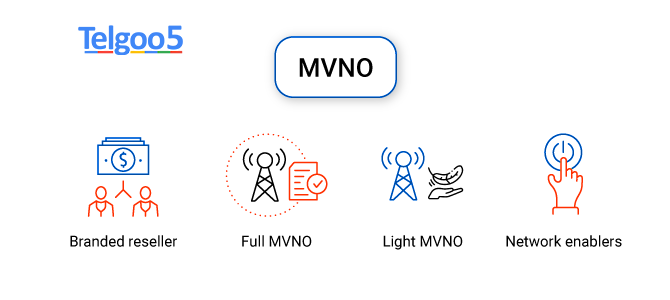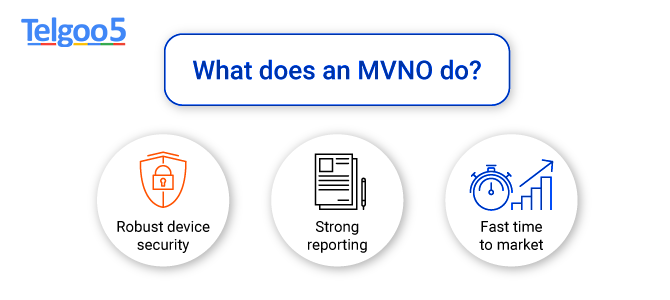
What is a mobile virtual network operator (MVNO)?
A mobile virtual network operator (MVNO) is a telecommunications service provider that offers mobile phone services, but does not own the infrastructure to provide them. Instead, MVNOs purchase network services wholesale from one or more mobile network operators and then rebrand and sell them to customers under their name. MVNOs can offer competitive mobile phone plans and services without investing in the expensive infrastructure to support a mobile network.
What makes a mobile virtual network operator unique?
A mobile virtual network operator (MVNO) is unique in the following ways:
-
Rebranding: MVNOs purchase network services from mobile network operators and rebrand them under their name, creating a unique customer experience.
-
Independent pricing and plans: MVNOs can offer their pricing and plans separately from the mobile network operators from whom they purchase services.
-
Targeted demographics: MVNOs often target specific demographics, such as budget-conscious consumers, seniors, or specific ethnic groups, with tailored services and plans.
-
Reduced infrastructure costs: MVNOs do not need to invest in the infrastructure required to support a mobile network, reducing overhead costs and offering more competitive prices.
-
Faster service and product innovation: MVNOs can be more agile and flexible in introducing new services and products, as they do not need to invest in upgrading their infrastructure.
These unique characteristics make MVNOs a popular alternative for consumers looking for more affordable and customized mobile phone services.
What does an MVNO do?
A mobile virtual network operator (MVNO) provides mobile phone services to consumers, but does not own the infrastructure to support these services. Instead, an MVNO purchases network services wholesale from one or more mobile network operators and then rebrands and sells these services to its customers under its name. An MVNO is responsible for the following activities:
1. Marketing and customer acquisition: MVNOs market and sell their services to their target customers.
2. Customer service and support: MVNOs handle customer service and support for their subscribers, including billing, technical support, and troubleshooting.
3. Network management: MVNOs manage the network services they purchase from mobile network operators to ensure reliable and high-quality customer coverage.
4. Plan and pricing management: MVNOs set their pricing and plans for their customers, offering a unique and customized experience.
5. Mobile phone and device sales: MVNOs may also sell mobile phones and devices to their customers directly or through partnerships with manufacturers.
In summary, MVNOs are responsible for the end-to-end customer experience, from marketing and customer acquisition to customer service and support, all while leveraging the network infrastructure of mobile network operators.

Why do mobile network operators need MVNOs?
Mobile network operators partner with mobile virtual network operators (MVNOs) for several reasons, including:
1. Increased revenue: MVNOs purchase wholesale network services from mobile network operators and rebrand and sell them to their customers, which provides mobile network operators with additional revenue from selling network services to MVNOs.
2. Customer acquisition and retention: MVNOs can target specific customer segments, such as budget-conscious consumers, seniors, or specific ethnic groups, and help mobile network operators reach and retain these customers.
3. Better use of excess network capacity: Mobile network operators often have excess network capacity, and partnering with MVNOs helps them better use this capacity, improving their overall utilization and efficiency.
4. Increased brand exposure: MVNOs can promote and advertise the mobile network operator’s brand, increasing its visibility and exposure in the market.
5. Innovation: MVNOs can introduce new services and products more quickly and easily than mobile network operators, allowing the latter to stay innovative and competitive in the market.
MVNO partnerships can help mobile network operators increase revenue, reach new customers, improve network utilization, increase brand exposure, and drive innovation.
What kind of MVNOs are there?
There are several types of mobile virtual network operators (MVNOs), including:
1. Discount MVNOs: These MVNOs target budget-conscious consumers with low-priced plans and services, often using the network of a single mobile network operator.
2. Niche MVNOs: These MVNOs target specific customer segments, such as seniors, ethnic groups, or travelers, with tailored services and plans.
3. Full-service MVNOs: These MVNOs offer a full range of mobile phone services, including voice, data, and text, and often partner with multiple mobile network operators to ensure broad coverage.
4. Data-focused MVNOs: These MVNOs provide high-speed data services, such as mobile internet and hotspot services, to their customers.
5. Branded MVNOs: These MVNOs are often owned by large brands, such as supermarkets or cable companies, and offer mobile phone services under their brand name.
6. Enterprise MVNOs: These MVNOs cater to the needs of businesses and organizations, offering customized mobile phone plans and services for their employees.
Each type of MVNO offers a unique set of services and plans, targeting different customer segments and providing a competitive alternative to traditional mobile network operators.

What do MVNOs need to be competitive?
To be competitive, MVNOs (Mobile Virtual Network Operators) need the following key elements:
1. Cost-effective network access: MVNOs need to secure a reliable and cost-effective access to a mobile network from a host carrier, often at wholesale rates.
2. Unique Value Proposition: MVNOs need to differentiate themselves from other providers by offering a unique value proposition to their customers, such as lower prices, specialized services, or targeted customer segments.
3. Strong Brand: MVNOs need a strong brand that resonates with their target customers and effective marketing to reach and retain them.
4. Good customer service: MVNOs must provide high-quality customer service to ensure customer satisfaction and loyalty.
5. Flexible business model: MVNOs need to be able to quickly adapt to changing market conditions and customer demands, and their flexible business model must allow them to offer new services and packages as needed.
6. Effective back-end operations: MVNOs need an effective back-end operation, including billing, customer service, and network management, to support their customer-facing activities and ensure a seamless customer experience.
Contact us today to get a consultation!
Send us a message to get answers to any of your questions & we'll get back to you within 24-48 hours or as soon as possible.
